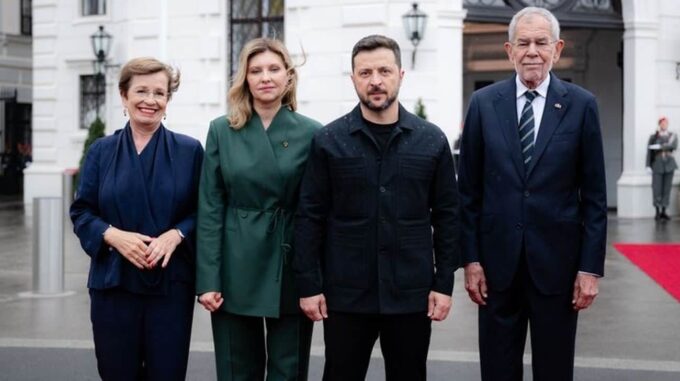Ukrainian President Volodymyr Zelensky’s visit to Austria began with a unique gesture from Kyiv — it is the first official trip of a Ukrainian leader to the country since the start of the large-scale Russian-Ukrainian war

This decision underscores the importance of bilateral relations and the desire to activate diplomatic dialogue amid ongoing hostilities and efforts to find a peaceful resolution to the conflict. Zelensky, together with First Lady Olena Zelenska, arrived in Austria’s capital, Vienna, where they were greeted with a ceremonial reception by Austrian President Alexander Van der Bellen and his wife Doris Schmidauer. The ceremony took place at 14:00 Kyiv time (13:00 Vienna time) and was filled with official pomp and symbolic gestures of friendship. This was the Ukrainian president’s first visit to the country since the war began, becoming a significant event in European politics. After the ceremonial events, the working part of the visit commenced. At 15:00 local time (16:00 Kyiv time), a joint briefing with journalists was held, during which Zelensky and Van der Bellen discussed key issues of bilateral cooperation, the security situation in Ukraine, and European solidarity in the context of the war. At 15:30 (16:30 Kyiv time), a meeting between the Ukrainian leader and Austrian Chancellor Karl Nehammer was planned — a so-called “showcase moment” of the diplomatic visit, during which Oleksandr Zelensky had the opportunity to discuss strategic matters related to peace settlement and humanitarian challenges. Given the heightened security measures in the city center, many streets were closed off from early morning to ensure the protection of high-ranking officials and prevent potential provocations. Information about security preparations indicates a serious approach by Austrian law enforcement to safeguarding guests and ensuring a smooth process of the visit. The background of this trip dates back to last year, when media reports began emerging that Austria planned to make Vienna a venue for peace negotiations to end the war in Ukraine. Within the context of international diplomacy, this visit is significant because Austria has so far maintained a position of neutrality and refrained from openly supporting any side of the conflict. However, not everyone in the country shared this stance. In particular, representatives of far-right political forces expressed concern about the possible consequences of neutrality policy and its compatibility with current challenges. They demanded a report from government officials on the preparation process of Zelensky’s visit, voicing fears that this step could impact the country’s status as a neutral party in the war. While the specific results and agreements are still under wraps, expert and political commentary suggest that Kyiv and Vienna are committed to fruitful cooperation and increased dialogue. The visit is an important symbol of Ukraine’s support from one of its European partners, which seeks to contribute to finding pathways to peace, as well as a confirmation that even countries traditionally practicing neutrality are becoming more actively involved in global efforts to resolve the military conflict. Overall, Zelensky’s visit to Vienna sends a clear signal to the international community: Ukraine is not alone in its fight for independence and territorial integrity; it is engaging partners and exploring new avenues for peace, even in countries that previously preferred diplomatic restraint during wartime.

